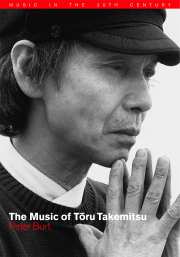Book contents
- Frontmatter
- Contents
- Acknowledgements
- Note on conventions
- Introduction
- 1 Pre-history: how Western music came to Japan
- 2 Music and ‘pre-music’: Takemitsu's early years
- 3 Experimental workshop: the years of Jikken Kōbō
- 4 The Requiem and its reception
- 5 Projections on to a Western mirror
- 6 ‘Cage shock’ and after
- 7 Projections on to an Eastern mirror
- 8 Modernist apogee: the early 1970s
- 9 Descent into the pentagonal garden
- 10 Towards the sea of tonality: the works of the 1980s
- 11 Beyond the far calls: the final years
- 12 Swimming in the ocean that has no West or East
- Notes
- List of Takemitsu's Works
- Select bibliography
- Index
2 - Music and ‘pre-music’: Takemitsu's early years
Published online by Cambridge University Press: 18 August 2009
- Frontmatter
- Contents
- Acknowledgements
- Note on conventions
- Introduction
- 1 Pre-history: how Western music came to Japan
- 2 Music and ‘pre-music’: Takemitsu's early years
- 3 Experimental workshop: the years of Jikken Kōbō
- 4 The Requiem and its reception
- 5 Projections on to a Western mirror
- 6 ‘Cage shock’ and after
- 7 Projections on to an Eastern mirror
- 8 Modernist apogee: the early 1970s
- 9 Descent into the pentagonal garden
- 10 Towards the sea of tonality: the works of the 1980s
- 11 Beyond the far calls: the final years
- 12 Swimming in the ocean that has no West or East
- Notes
- List of Takemitsu's Works
- Select bibliography
- Index
Summary
Encrypted at one point in the music of Takemitsu's late work Family Tree – Musical Verses for Young People (1992) is a kind of coded biographical allusion. When the girl narrator, introducing us in turn to each member of her family, comes to her father, the music launches suddenly into something like pastiche big-band jazz of the swing era. For the listener familiar with the biographical details of Takemitsu's earliest years, his private reasons for considering ‘jazz’ an apt metaphor for the paternal at this point are easily fathomed. Although born – on 8 October 1930 – in the Hongō district of Tōkyō, within a month of his birth Tōru Takemitsu had joined his father Takeo at his place of employment, the town of Dalian (Luda) in the region of China then known to the Japanese as Manchuria, and administered by them as a colony. There, enjoying a privileged lifestyle as a member of the expatriate community, Takeo Takemitsu had been able to indulge one of his favourite passions more frequently than might otherwise have been possible: the performance of jazz records from his vast personal collection. He had one or two other musical enthusiasms too, which it is just possible might have had some influence on the developing musical sensibilities of his son: the Takemitsu biographer Kuniharu Akiyama notes that he was for a while ‘fanatical’ about playing the shakuhachi, and won first prize at a competition for making imitation bird sounds.
- Type
- Chapter
- Information
- The Music of Toru Takemitsu , pp. 21 - 38Publisher: Cambridge University PressPrint publication year: 2001

